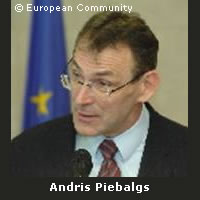Commission outlines plan to boost research on energy efficient technologies
EU Commissioner for Energy, Andris Piebalgs, has provided further details of the forthcoming European Strategic Energy Technology Plan. Speaking to an audience at the EU Energy and Law conference on 25 January, Mr Piebalgs spoke of Europe's missed opportunity in taking the lead in the emerging multi-billion euro market for low carbon and energy efficient technologies. 'There is clear evidence that despite a doubling of funds in the Seventh Framework Programme for energy over the Sixth, the US, Japan and China are moving ahead more quickly,' said the Commissioner. 'Europe is missing an opportunity; it needs to profit from its commitment to deal with climate change - pricing carbon through the emissions trading mechanism - and to use this as a springboard to develop an innovation-driven energy sector, leading the world and creating enormous export and job creation opportunities for Europe,' he continued. To put the EU at the forefront of the next generation of low carbon and renewable energies, the Commission is preparing a European Strategic Energy Technology Plan that aims to set clear objectives and targets for Europe's energy research and technology. Targets will include developing second generation biofuels to the point where they become fully competitive alternatives to hydrocarbons, and making large scale offshore wind competitive within the short term, paving the way towards a European offshore supergrid. The plan will also outline clear objectives on such areas as getting photovoltaic electricity ready to harness solar energy, making faster progress towards fourth generation fission nuclear reactors and future fusion technology, and developing better sustainable coal and gas technologies, particularly carbon capture and storage. 'These are just examples, in 2007 we shall propose a concrete programme to better coordinate existing resources, to use them in a more targeted and focused manner and, where necessary, invest more,' said Mr Piebalgs. The Commission intends to draw up the plan in consultation with stakeholders such as the relevant European Technology Platforms and FP7 Advisory Groups. A public consultation will also take place, and the Commission hopes to present the final version of the plan to the European Heads of State and Government at their Spring Council in 2008.



